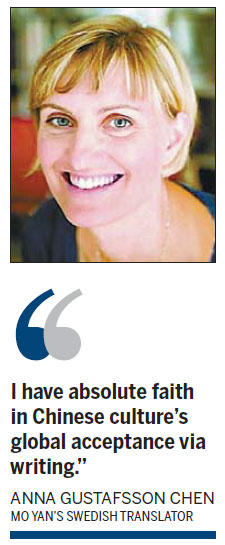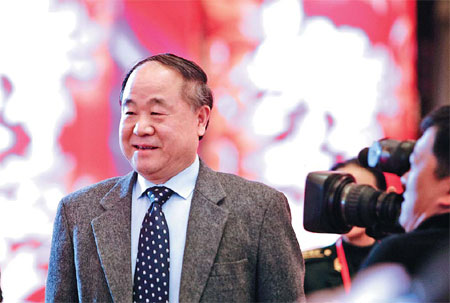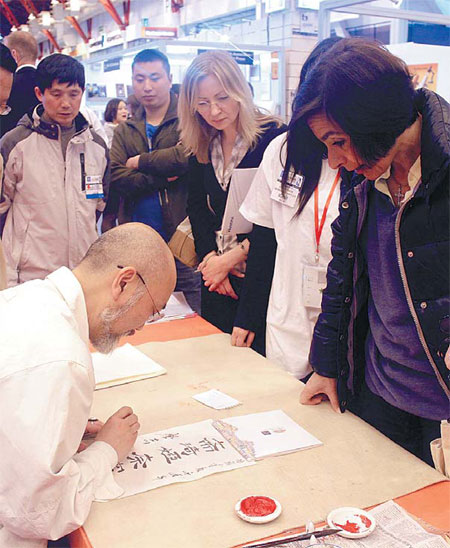China writes its way onto the world stage
Updated: 2013-01-31 07:23
By Mei Jia (China Daily)
|
||||||||

|
Mo Yan is in the spotlight during a recording in Beijing on Jan 13 of the China Federation of Literary and Art Circles' Spring Festival celebration. Xiao Yi / for China Daily |
|
Visitors line up for calligraphic work by the Chinese artist Fan Dachuan at the 2012 London Book Fair. China was honored as the Market Focus country for the first time, with books about Chinese language and learning calligraphy being popular at the fair. Bai Xu / Xinhua |

Mo Yan's Nobel Prize win has prompted a surge of interest in Chinese writing. Mei Jia in Beijing finds out more.
Chinese writers have rarely enjoyed the spotlight as much as they did in 2012.
Mo Yan, who was born and lives in China, brought attention to Chinese writing when he won the Nobel Prize in literature.
The Mo Yan effect is spreading - creating opportunities for Chinese literature to reach a global audience.
Critics expect more translators will be needed to render Chinese works into various languages. Meanwhile, Chinese officials and publishing professionals are making efforts to present more interesting reading to the international market.
The year 2013 is set to witness more excitement for Chinese literature.
Post-Nobel craze
Mo Yan has become a celebrity, appearing not only in literary journals, but also on arts and entertainment pages. The Nobel effect has made him a widely loved idol. Mo is "proving the capability of Chinese writers, and encouraging people to have faith in Chinese writing", Chinese Writers' Association chairwoman Tie Ning said.
After the announcement of Mo's Nobel win in October, up to 920,000 people a day searched for information about Mo, according to search engine Baidu. Before the news, there was an average of 2,000 daily searches.
Mo's works became the year's bestsellers. According to surveys by the Open Book, a book sales monitor in China, monthly sales of his work multiplied 199 times compared with before his win. Frog, the story of the effects of China's family planning policy, is among the most popular.
The Open Book said that in 2012 Mo contributed 0.47 percent to the Chinese book market, while in 2011 he only made up 0.01 percent.
The paperback edition of Mo Yan Anthology sold 200,000 copies, and the hardcover reached 100,000. Employees from his agent, Beijing Genuine and Profound Culture Development Co, said Mo's collections are selling well because many customers give them as presents during Spring Festival.
Suddenly, Mo was everywhere. His image became part of a test for elementary school students, asking the young students to identify the writer. Textbook writers are considering including his work into the high school curriculum. They are known for their high standard in selecting the texts.
Rumors are also flying that Mo's book Big Breasts and Wide Hips is to be adapted into film, possibly directed by Zhang Yimou, and that Mo is said to be planning to attend the CCTV Spring Festival gala.
It's probably the first time in a decade that writers' names have appeared in entertainment news. The Mo effect has also reached other writers, including Feng Tang and Zhang Chengzhi, making them a feature of gossip columns.
Writers being at the center of public interest is a sharp contrast to a popular statement that literature, especially serious literature, is dying.
On the contrary, more people are interested in literature, spurred by Mo's influence.
On Jan 22, Mo was named director of the International Writing Center at his Alma Mater, Beijing Normal University, said to be the first of its kind in China.
Renmin University Press editor He Yaomin said in early January that a series of books on creative writing developed by the press have, "Unexpectedly, sold extremely well".
Mo is not the only Chinese writer who is being embraced internationally.
"Americans already viewed Chinese literature as an extremely important part of world literature, but the Nobel Prize always focuses attention more concretely," said veteran literary critic Carlin Romano, former president of The National Book Critics Circle in the US and author of America the Philosophical.
"I am sure that editors in American publishing are right now scrutinizing Chinese writers more closely than ever, looking for novels that will translate well into English," Romano added.
As a result, there has been a spike in highly acclaimed literary awards shortlisting Chinese writers.
In December, Sheng Keyi was long-listed for the Man Asian Literary Prize 2012, for her rural girl adventure book Northern Girls.
In January 2013, the Man Booker International Prize included Yan Lianke in the list of 10 international writers for his Lenin's Kisses. The winners will be announced in May.
Translators essential
Chairwoman Tie tells an anecdote about a time Mo was in Spain and unwell. He went to a hospital and saw the doctor there, who happened to be a faithful reader of his works.
But not all writers are so well-known. According to statistics from the writers' association, an average of 2,000 novels are published in China every year. "Far more than in decades ago," said critic Zhang Yiwu from Peking University.
Among them, only 1,000 books from 150 writers are translated into other languages, according to the association, which amounts for 1.6 percent of the association's 9,125 members.
"More effective than the film adaptations (such as The Red Sorghum) in Mo's case, translators are a Chinese writer's shortcut to a prestigious global award like the Nobel," cultural critic Shi Hang said.
Mo, probably the contemporary writer who has the biggest number of foreign versions of his works, invited several of his translators to witness him accept his award in Stockholm in December.
"They're the ones to be honored," Mo said.
But the world market, especially Western readers' reluctance to read translations, and accept "new" writers, has set barriers for Chinese writers to reach a wider audience.
Critic Romano believes that as a general rule, American publishers do a poor job of translating foreign works.
"They simply don't publish enough. This has been a longstanding complaint of publishing professionals in, for instance, France, Italy and Germany. China is joining an already crowded club," he said.
This concern is shared by many translators and Sinologists, including Mo's Swedish translator Anna Gustafsson Chen.
In August, Gustafsson Chen spoke at a meeting of 10 Chinese writers and 27 translators organized by the writers' association. She said she saw a rare opportunity to publish Chinese books, and a rare chance to train young and willing translators. "Translators barely feed themselves only through doing translation," she said.
Gustafsson Chen said that of the more than 10,000 titles published in her country in 2011, 2,900 were translations, and only two were translated from Chinese.
"The two were printed in small numbers in my country that is famous for educated and zealous readers," she said.
She believes strongly the Nobel win offers a springboard for Chinese writing's global acceptance.
"The Nobel will help the situation improve," she wrote on her blog after learning of Mo's win.
"The change may be slow, but it's definitely to come," she said, adding it is possible Mo's works will be published in volumes of tens of thousands in her country.
That might be encouraging for increasing numbers of interested and qualified translators.
"Interest in studying Chinese continues to grow rapidly in the US. For the moment, students with a special interest in business, economics and politics lead the charge," Romano said.
And Romano believes it's inevitable that the growth of Chinese will eventually produce successors to Howard Goldblatt - expert translators capable of rendering Chinese literature into excellent English.
GAPP's plans
Working in a multinational environment, Kent Xu, managing director of China Risk Lead at Accenture, noticed a lack of people reading Chinese books around him.
"I believe serious literature readers have varied tastes, and the books of Nobel winning writers are a good reason for them to spend time reading," Xu said.
Besides winning international prizes, other serious efforts are being made to boost Chinese literature's global appeal.
The General Administration of Press and Publication launched series of projects and is planning to offer more support to publish literature abroad.
"Contemporary literature is a key element of Chinese publications going global," said Zhang Fuhai, director general of the international exchange and cooperation department of the administration.
"It's approachable and efficient in introducing China," Zhang said, adding that in 2013 literature will be a focus of the working projects.
GAPP has been using international book fairs and its own channels to help overseas publications. It has awarded foreign translators with the China Special Book Award for six years to encourage translation.
Thanks to efforts by GAPP and publishers, more than 160,000 Chinese titles appear on online marketplace Amazon's China Bookstore. French company the Lagardere Group, who has 3,100 bookstores around the world, sold 210,000 copies of China-themed books in 2012, according to GAPP.
Jia Huili from Zhang's department told China Daily the administration is preparing and investigating a new China Writers International project.
Centering on 20 established Chinese writers, GAPP is to support 20 publishers to take care of plans for writers to go global with policies, funds, guidance and platforms. Mo, of course, is a key member of the project, Jia said.
Jia said GAPP is to also gradually build up a database for both writers and translators, to offer more support.
"I have absolute faith in Chinese culture's global acceptance via writing," Gustafsson Chen said.
Contact the writer at meijia@chinadaily.com.cn
(China Daily 01/31/2013 page7)

 In Photos: 7.0-magnitude quake hits Sichuan
In Photos: 7.0-magnitude quake hits Sichuan
 Li Na on Time cover, makes influential 100 list
Li Na on Time cover, makes influential 100 list
 FBI releases photos of 2 Boston bombings suspects
FBI releases photos of 2 Boston bombings suspects
 World's wackiest hairstyles
World's wackiest hairstyles
 Sandstorms strike Northwest China
Sandstorms strike Northwest China
 Never-seen photos of Madonna on display
Never-seen photos of Madonna on display
 H7N9 outbreak linked to waterfowl migration
H7N9 outbreak linked to waterfowl migration
 Dozens feared dead in Texas plant blast
Dozens feared dead in Texas plant blast
Most Viewed
Editor's Picks

|

|

|

|

|

|
Today's Top News
Live report: 7.0-magnitude quake hits Sichuan, heavy casualties feared
Boston suspect cornered on boat
Cross-talk artist helps to spread the word
'Green' awareness levels drop in Beijing
Palace Museum spruces up
First couple on Time's list of most influential
H7N9 flu transmission studied
Trading channels 'need to broaden'
US Weekly

|

|









